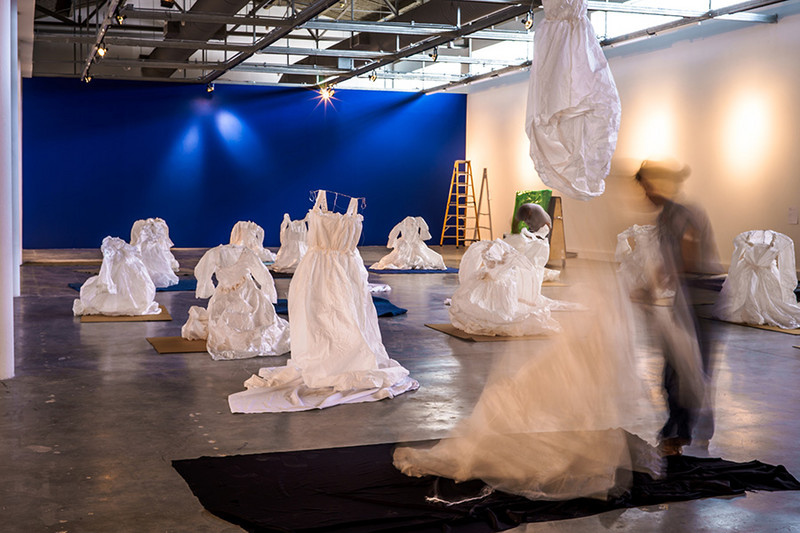Marielle Plaisir
24 Mar - 29 May 2016
MARIELLE PLAISIR
Acta NonVerba
24 March - 29 May 2016
ACTIONS ON BOTH SIDES OF THE MIRROR
Acceleration and alienation postulate the root elements of modernization and contemporary life, and, therefore, one of the fundamental concepts of our age. The expansion of memory, attributable to the acceleration of history, and the hyper-production of information has created what historian Pierre Nora refers to as “sites of memory.” The XXI century has introduced a remarkable blast in “memorialist” cultural creation such as museums, digital libraries, memorials, media, archives, and collections, handling the history and memory of globalized intercultural communication.
Marielle Plaisir
Within this context, Marielle Plaisir’s Acta NonVerba turns the museum space into a zone for de-acceleration as a “site of memory,” a space where contemporary art exercises to look, question and think when it seems that segments of our local and global societies simply are no longer able to understand the world in all its complexity.
The underlying assumption in Plaisir’s exhibition centers on art as a clue tool, similar to the classical “art of memory” or to the contemporary “memory theaters”, where ideas and reflections on the Caribbean and the Americas, their past, and post-colonial present are staged, thus constituting reference points in the frameworks of collective memory.
In her contemporary narrative, Plaisir approaches issues such as identity, domination, discrimination and the look of the “Other”. Recreated fabric, dresses, portraits, tapestries, drawings, and paintings reflect questions about image and self-image as well as analogies of the self and reinvention of the self. Built on fabric, clothing, dressing and the body, the narrative addresses complexities in moral and aesthetic patterns that govern the use of alternatives to establish identity/ies.
Through a performance experience, central to her proposal, and installations that provide an opportunity for interaction, the exhibition is a point of departure for viewers to look, question, and decide the reality of a confrontation between what they see and perceive, and who they are.
In Acta NonVerba, the artist lives simultaneously in two kinds of time. In one, she bears the burden of Western history, the complex, contradictory story of how we came to be where we are today. In another, emerging from the Caribbean, she experiences the past in a different way, an inherited fractured past, as if particles were omitted from history. Her task then as she sees it, is to travel through this past gathering those elements that mysteriously speak to her sensibilities.
Carefully structured through a narrative in the exhibition space where the artist as performance experiences the usurping of a different identity through apparel, the viewer will come to realize that what he/she does not see is greater than what he/she sees.
In Acta NonVerba, the works of art are not utopia, but an idea made real and imposed on the world.
Acta NonVerba
24 March - 29 May 2016
ACTIONS ON BOTH SIDES OF THE MIRROR
Acceleration and alienation postulate the root elements of modernization and contemporary life, and, therefore, one of the fundamental concepts of our age. The expansion of memory, attributable to the acceleration of history, and the hyper-production of information has created what historian Pierre Nora refers to as “sites of memory.” The XXI century has introduced a remarkable blast in “memorialist” cultural creation such as museums, digital libraries, memorials, media, archives, and collections, handling the history and memory of globalized intercultural communication.
Marielle Plaisir
Within this context, Marielle Plaisir’s Acta NonVerba turns the museum space into a zone for de-acceleration as a “site of memory,” a space where contemporary art exercises to look, question and think when it seems that segments of our local and global societies simply are no longer able to understand the world in all its complexity.
The underlying assumption in Plaisir’s exhibition centers on art as a clue tool, similar to the classical “art of memory” or to the contemporary “memory theaters”, where ideas and reflections on the Caribbean and the Americas, their past, and post-colonial present are staged, thus constituting reference points in the frameworks of collective memory.
In her contemporary narrative, Plaisir approaches issues such as identity, domination, discrimination and the look of the “Other”. Recreated fabric, dresses, portraits, tapestries, drawings, and paintings reflect questions about image and self-image as well as analogies of the self and reinvention of the self. Built on fabric, clothing, dressing and the body, the narrative addresses complexities in moral and aesthetic patterns that govern the use of alternatives to establish identity/ies.
Through a performance experience, central to her proposal, and installations that provide an opportunity for interaction, the exhibition is a point of departure for viewers to look, question, and decide the reality of a confrontation between what they see and perceive, and who they are.
In Acta NonVerba, the artist lives simultaneously in two kinds of time. In one, she bears the burden of Western history, the complex, contradictory story of how we came to be where we are today. In another, emerging from the Caribbean, she experiences the past in a different way, an inherited fractured past, as if particles were omitted from history. Her task then as she sees it, is to travel through this past gathering those elements that mysteriously speak to her sensibilities.
Carefully structured through a narrative in the exhibition space where the artist as performance experiences the usurping of a different identity through apparel, the viewer will come to realize that what he/she does not see is greater than what he/she sees.
In Acta NonVerba, the works of art are not utopia, but an idea made real and imposed on the world.

